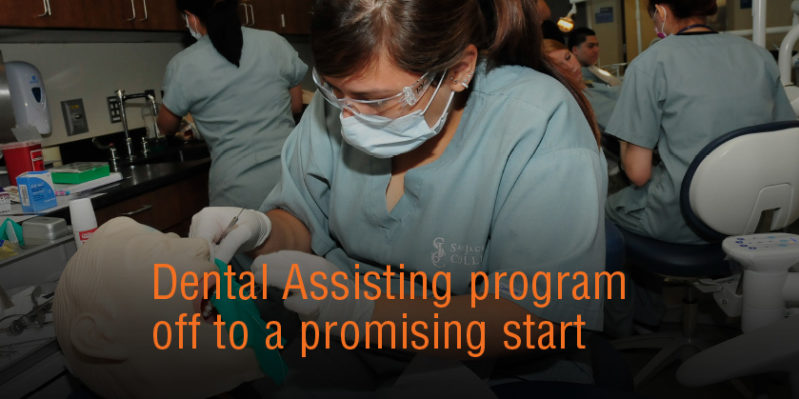
Dental assisting, a new allied health program at San Jacinto College, is off to a promising start.
“The program is still in its infancy and has officially graduated two classes,” commented Sarah Pinto, dental assisting program director. “Thus far, the average completion rate stands at 91.5 percent. We have started the third class and anticipate 100 percent completion with increased resources via open labs and tutorials.”
The Dental Assisting Certificate of Technology is a three-semester science-oriented and skill development program. The program includes lecture, laboratory, and clinical practice.
Classes in the first term include Dental Science, Dental Radiography, Preventative Dentistry, Chairside Assisting, and Dental Materials. Courses in the second term include Advanced Dental Science, Dental Radiology in the Clinic, Dental Office Management, Dental Assisting Applications, Dental Laboratory Procedures, and Practicum (field experience). Courses in the third term include Communications and Behavior in the Dental Office, Seminar for the Dental Assistant, and Practicum.
Pinto says there are many positives that make dental assisting an attractive allied health career path. “It is all about the close interaction with patients and relationships established over time,” she said. “A dental assistant sees patients regularly and oftentimes gets to meet and treat an entire family, sometimes even multiple generations. Relieving people of oral pain and providing patient education to promote healthy lifestyle choices is very rewarding.”
Another positive feature of dental assisting is the schedule. “The family-friendly work schedule is a huge draw. A dental assistant does not have to worry about being on call,” commented Pinto.
The career also offers a fairly good annual salary, especially considering that it requires only three college semesters of training. According to the Texas Workforce Commission’s labor tracer website, the average annual salary for an entry-level dental assistant in the Gulf Coast area is $24,376. The average median annual salary is $33,533, and the average annual salary for an experienced dental assistant in the Gulf Coast area is $38,285.
Pinto noted that recent research indicates that dental assisting is a high-demand career field, with demand projected to remain high for the foreseeable future. “The demand is high because our aging population is living longer, and more people nowadays want to restore their teeth rather than ‘yanking them all out’ like in the good ol’ days,” she remarked. “Also, more dentists are delegating duties to trained dental assistants in order to keep up with today’s demand for oral healthcare. For every one dentist, most offices hire at least two or three dental assistants.”
The San Jacinto College dental assisting program stresses the connection between dental hygiene and good health, and how neglecting dental hygiene contributes to health problems.
“We emphasize patient education in our curriculum, particularly since the dental assistant is the first point of contact, and often the last after the dentist leaves a treatment room,” Pinto commented. “There is a link between oral health and overall health, but some do not see the connection and view the mouth as separate from the rest of the body, as if neither were connected. Neglecting dental hygiene can result in infections that can close the airway and can become life-threatening. Research shows that periodontal disease can lead to cardiovascular problems. Tooth loss to decay or periodontal disease typically compromises the immune system. That’s why our program stresses raising the public’s dental IQ.”
Rob Vanya

